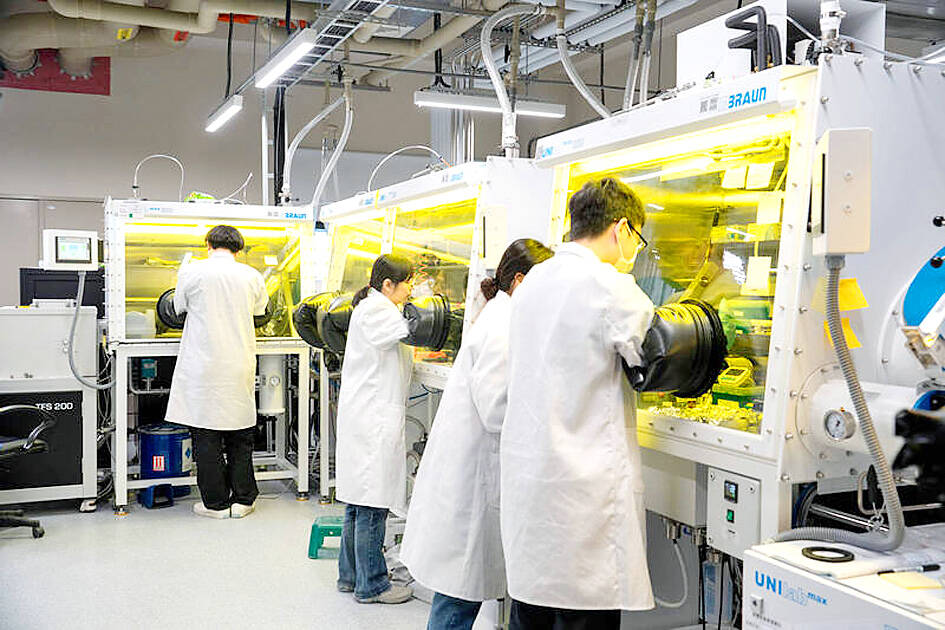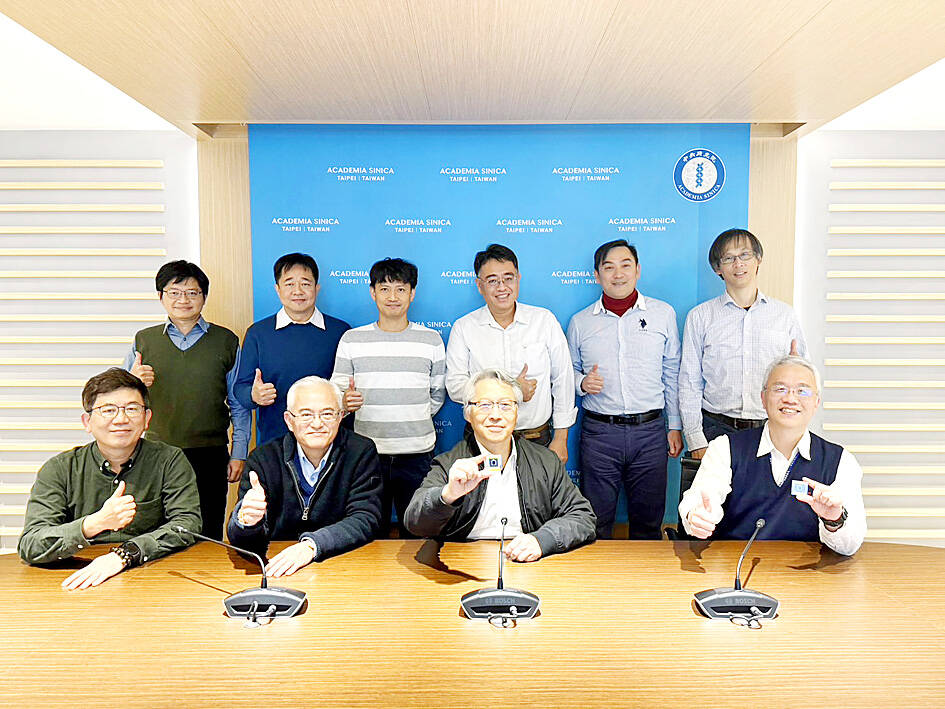Taiwan has developed next-generation solar cell components that would boost solar-cell efficiency by more than 31 percent, Academia Sinica said yesterday.
Boosting solar-cell efficiency is key in developing solar energy in the nation, given the limited space available to install solar panels, the institute said in a statement.
Currently, the highest light-to-electricity conversion efficiency achieved by silicon solar cells is about 22 to 24 percent, the institute said, adding that it is nearly impossible to increase efficiency by 30 percent with silicon solar cells alone.

Photo courtesy of Academia Sinica
However, perovskite films can be combined with silicon solar cells to form stacked perovskite/silicon solar cells to improve light-to-electricity conversion efficiency, it said.
The institute formed a research group to develop perovskite/silicon tandem solar cells after Academia Sinica President James Liao (廖俊智) finalized the decision, with its own researchers being joined by those from National Cheng Kung University, National Tsing Hua University and Ming Chi University of Technology, it said.
The research team succeeded in creating perovskite/silicon tandem solar cells in two years, boosting the light-electricity conversion efficiency to more than 31 percent, Liao said.

Photo courtesy fo the Academia Sinica via CNA
“The efficiency is more than 30 percent higher than solar cell products currently on the market. Compared with the solar power generation devices deployed in the early years, the efficiency has increased by nearly 50 percent. Power generation can be increased without increasing the properties required to develop solar energy,” he said.
Silicon solar cell modules can only absorb part of the wavelength of sunlight, resulting in limited conversion efficiency. Tandem solar cells use the upper layer of perovskite to absorb photons that cannot be absorbed by silicon crystal, and the remaining photons are absorbed by the lower layer of silicon crystal, thereby increasing the conversion efficiency, the institute said.
The research team has broken through several key connection layer technologies, successfully laminated perovskite films on silicon cells and reduced interface losses, thus completing the production of small-area two-terminal cell components. The light-electricity conversion efficiency has reached 31.5 percent, the institute said.
There is sufficient supply of materials to produce perovskite/silicon solar cells, which can be manufactured at lower costs, run efficiently and are recyclable, the team said.
“The result shows that Taiwan has the ability to produce perovskite/silicon tandem solar cells, which also have a high potential to be commercialized,” the team said.

CHAOS: Iranians took to the streets playing celebratory music after reports of Khamenei’s death on Saturday, while mourners also gathered in Tehran yesterday Iranian Supreme Leader Ayatollah Ali Khamenei was killed in a major attack on Iran launched by Israel and the US, throwing the future of the Islamic republic into doubt and raising the risk of regional instability. Iranian state television and the state-run IRNA news agency announced the 86-year-old’s death early yesterday. US President Donald Trump said it gave Iranians their “greatest chance” to “take back” their country. The announcements came after a joint US and Israeli aerial bombardment that targeted Iranian military and governmental sites. Trump said the “heavy and pinpoint bombing” would continue through the week or as long

TRUST: The KMT said it respected the US’ timing and considerations, and hoped it would continue to honor its commitments to helping Taiwan bolster its defenses and deterrence US President Donald Trump is delaying a multibillion-dollar arms sale to Taiwan to ensure his visit to Beijing is successful, a New York Times report said. The weapons sales package has stalled in the US Department of State, the report said, citing US officials it did not identify. The White House has told agencies not to push forward ahead of Trump’s meeting with Chinese President Xi Jinping (習近平), it said. The two last month held a phone call to discuss trade and geopolitical flashpoints ahead of the summit. Xi raised the Taiwan issue and urged the US to handle arms sales to

BIG SPENDERS: Foreign investors bought the most Taiwan equities since 2005, signaling confidence that an AI boom would continue to benefit chipmakers Taiwan Semiconductor Manufacturing Co’s (TSMC, 台積電) market capitalization swelled to US$2 trillion for the first time following a 4.25 percent rally in its American depositary receipts (ADR) overnight, putting the world’s biggest contract chipmaker sixth on the list of the world’s biggest companies by market capitalization, just behind Amazon.com Inc. The site CompaniesMarketcap.com ranked TSMC ahead of Saudi Aramco and Meta Platforms Inc. The Taiwanese company’s ADRs on Tuesday surged to US$385.75 on the New York Stock Exchange, as strong demand for artificial intelligence (AI) applications led to chip supply constraints and boost revenue growth to record-breaking levels. Each TSMC ADR represents

Pro-democracy media tycoon Jimmy Lai’s (黎智英) fraud conviction and prison sentence were yesterday overturned by a Hong Kong court, in a surprise legal decision that comes soon after Lai was jailed for 20 years on a separate national security charge. Judges Jeremy Poon (潘兆初), Anthea Pang (彭寶琴) and Derek Pang (彭偉昌) said in the judgement that they allowed the appeal from Lai, and another defendant in the case, to proceed, as a lower court judge had “erred.” “The Court of Appeal gave them leave to appeal against their conviction, allowed their appeals, quashed the convictions and set aside the sentences,” the judges